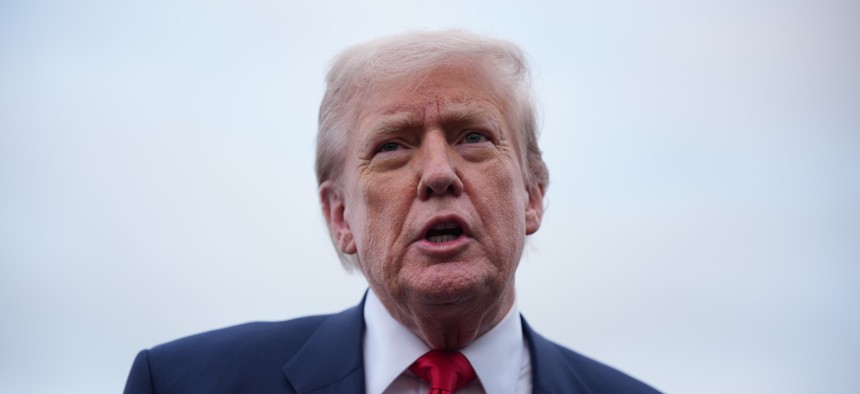
President Donald Trump speaks to the media as he arrives at Glasgow Prestwick Airport on July 25, 2025, in Prestwick, Scotland. Trump has removed several inspectors general during his second term. Andrew Harnik / Getty Images
2 independent watchdogs quietly replaced by Trump
The former acting Education inspector general had accused administration officials of stonewalling an investigation, and the ex-acting Commerce IG was removed from that position for a second time.
Donald Trump replaced two leaders of agency inspector general offices in the most recent incident of the president trying to exert more influence over the independent government watchdogs.
On June 4, Trump sent a 30-day notice to Congress that he would replace acting Education IG René Rocque with Heidi Semann, who has more than 20 years of experience as a federal criminal investigator and most recently was a senior special agent at the Federal Reserve Board OIG. According to the Education OIG website, Semann assumed the acting leadership role in July, and Rocque is back as deputy Education IG.
This was not the first time Trump tried to replace Rocque. On April 14, Trump provided Congress a similar 30-day-notice that he would swap her with Richard Smith in an acting capacity. But there’s no indication that such replacement actually happened.
Smith appears to be a career official who has held several senior positions at Education and is currently the delegated deputy secretary. Under current law, if there’s an IG vacancy, it should be filled by the “first assistant.” The president can appoint someone else in an acting capacity, but he is limited to selecting an employee of any OIG.
In both the April and June notice to Congress, Trump justified the replacement by arguing that “the changed priorities of my administration (as compared to the previous one) will be better reflected with new leadership in this office.” He also wrote that the notification was a “courtesy” and “show of comity and respect between the executive and legislative branches” that “should not be interpreted as a concession that the Congress can limit my power to remove any officer.”
On May 23, Rocque sent a letter to Congress that investigators had “experienced unreasonable denials and repeated delays from the [Education] Department in providing the OIG access to documents, staff and information” as part of an investigation into Trump’s workforce reductions that have resulted in cuts to half of the agency’s staff.
Also on June 4, Trump informed Congress in a similar 30-day notice that he would replace acting Commerce IG Roderick Anderson with Duane Townsend, who has been a federal criminal investigator since 1994 and most recently was a special agent in charge in the DOC OIG.
This was not Anderson’s first stint as an acting IG.
Former DOC IG Peggy Gustafson resigned in January 2024 following a scandal, and Anderson, as her deputy, took over in an acting capacity. Reps. Frank Lucas, R-Okla., and Zoe Lofgren, D-Calif., the then-leaders of the House Science Committee, urged former President Joe Biden to replace him, however, with someone who was not serving in that OIG office because of “the dysfunctional professional environment within the DOC OIG during IG Gustafson’s tenure.”
Biden adhered to their request and named Jill Baisinger, a senior official in the Interior Department’s OIG, as acting DOC IG. But Baisinger was removed by Trump as part of the January mass firing of the watchdogs, making Anderson, once again, the leader of the IG office.
Townsend is acting DOC IG, according to the office’s website, while Anderson is deputy again.
In the first week of his second term, Trump fired nearly 20 IGs, including at the Education and Commerce departments. The president justified the removals by saying that “some people thought that some were unfair, some were not doing their job,” and the White House said in a statement that the axed officials were “rogue, partisan bureaucrats who have weaponized the justice system against their political enemies.”
Democrats had argued that Trump’s initial firings of the IGs were illegal because he didn’t notify Congress 30 days beforehand, as required by law.
The Project on Government Oversight, a nonprofit good government group, condemned the replacements at Education and Commerce in a statement to Government Executive.
"The removal of these acting inspectors general undermines the independence of the watchdogs responsible for uncovering waste, fraud and abuse in the federal government,” said Faith Williams, director of POGO’s Effective and Accountable Government Program. “Congress must assert its oversight role so IGs can operate without fear of retaliation."
The Education OIG and DOC OIG referred questions to the White House, which did not respond to a request for comment.
The offices of Lofgren, Sen. Joni Ernst, R-Iowa, who leads the Senate IG Caucus and Sen. Gary Peters, D-Mich., who recently released a report into the effects of the IG firings, did not respond to a request for comment.
Sen. Chuck Grassley’s, R-Iowa, office said they could not provide a statement by press time. Grassley is a longtime IG defender.
Share your news tips with us:
Sean Michael Newhouse: snewhouse@govexec.com, Signal: seanthenewsboy.45
NEXT STORY: Whistleblower bill for contractors gains bipartisan support with Grassley’s backing







